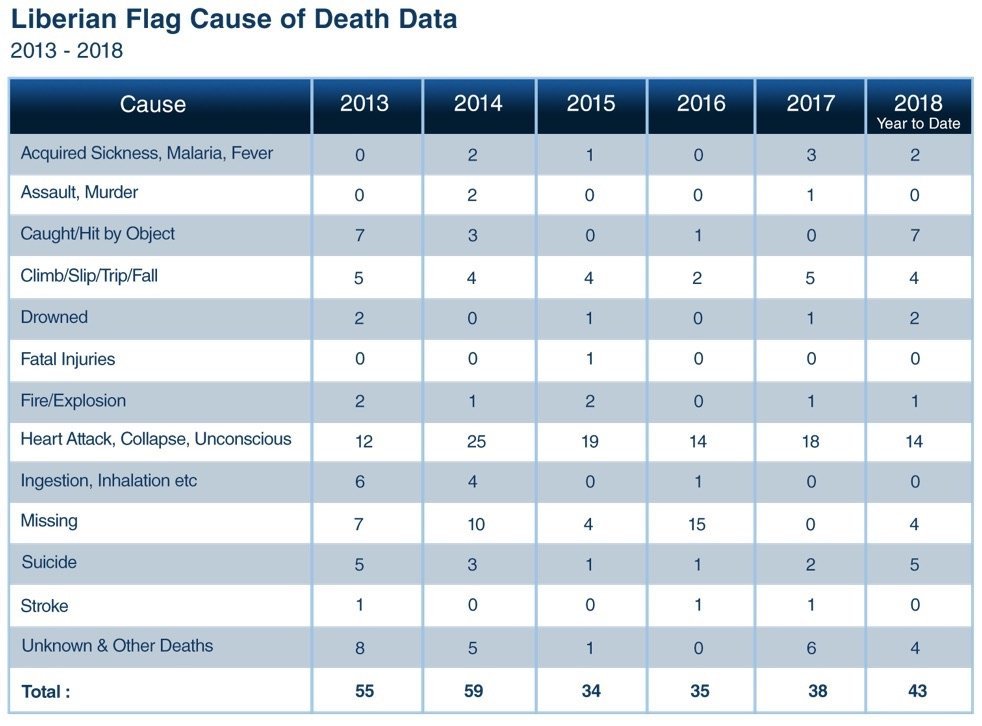You are here
What’s killing our seafarers?
What’s killing our seafarers?
Scott Bergeron November 1st, 2018 https://splash247.com/whats-killing-our-seafarers/
It is easy to forget the strength and brute force that the ocean can render. Few appreciate this more than the seafarers that ply the world’s waterways in support of global trade and economic growth. Ships are not designed for the calm waters of a protected harbour.
As a community, we have recognised the need to improve the safety of life at sea. Our present collective international efforts started in earnest in 1948 when the SOLAS Convention was first adopted at the International Maritime Organization’s predecessor, the International Maritime Consultative Organisation (IMCO). Where early SOLAS requirements focused on materiel standards, more recent updates include operational issues through the International Safety Management Code; crew training and competency issues through the Standards of Training, Certification and Watchkeeping for Seafarers Convention and most recently, the safety and welfare through the International Labour Organisation’s Maritime Labour Convention.
But we should ask ourselves, have we gone far enough —do we go far enough— to look after the safety of those that ensure the reliable and efficient delivery of raw materials, commodities and finished goods? At the Liberian Registry, we hold a weekly management meeting and a standing item on the agenda is a summary report on seafarer casualties. Unfortunately, this is a weekly reminder of the inherent dangers and the difficulty of working in remote areas of the world. Rarely a week goes by where we are not required to investigate the death of a seafarer.
No one expects to go to sea and not return home. Tragically, it is a living fear for those family and friends that every seafarer leaves behind as he or she starts a new multi-month contract. We consider it an inherent and globally shared passion to prevent accidents that cause injury and death. As such, we felt it would be useful to share the following Liberian Flag Cause of Death data we have collated for the last five years so that, we, as an industry, can try to make sense of these facts, figures and trends.
The very nature of shipping, and other industrial jobs, is that the environment comes with risk. Working with machinery, chemicals, fuel, and gasses in unforgiving surroundings means small accidents and oversights can have terrible consequences. Anyone who has served at sea understands this. The climb/slip/trip/fall numbers are a reminder to us all of what can happen when ‘everyday’ mistakes occur.
Seafarer health, welfare, and mental illness has been a regular topic of coverage in the trade press and, from the figures carried above, it appears this is an area that rightly requires attention; it is the largest killer at sea by these records. The occurrence of heart attacks and other similar health-related incidents may not be a surprise given the increasing age of seafarers. To a degree, we are taking common onshore ‘middle-age’ problems to sea.
According to our investigations, it is also likely that many of the missing crew are victims of suicide (though there is not enough evidence to classify their deaths as such). Solving this problem might require a rethink on how we address training and health education for seafarers and masters. Onshore everyone can access doctors, counsellors, and (dare I say it) online information about health issues. At sea things are different and employers and fellow seafarers do have a duty to each other to ‘red flag’ health and mental wellness concerns…because no one else can. But to do this crew must be supported by training and onshore empathy when issues are highlighted.
It is not an enjoyable task writing about what is killing our people. But it is vital that we share and talk about this information, and that we continue to highlight where improvements need to be made. I would encourage you to comment below if you have examples of where and how improvements can be made, and how other companies might learn from initiatives you have taken.

